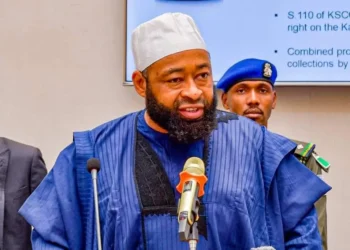Adnan Mukhtar Tudun-Wada, a former House of Assembly candidate, has criticized Seyi Tinubu for his recent Iftar tour in Northern Nigeria, accusing him of disrespecting the region and its people.
The Controversial Iftar Tour
Seyi Tinubu, son of President Bola Ahmed Tinubu, has come under fire for his recent Iftar tour in Northern Nigeria, where he distributed rice to residents during Ramadan. Adnan Mukhtar Tudun-Wada, a public relations practitioner and university lecturer, described the gesture as an insult to the North, accusing Seyi of treating the region’s people like beggars.
“As young people who are mature enough to see for ourselves, I want to tell the President’s son that this is not the time for campaign but for governance,” Adnan said in a statement issued on Tuesday. “Because he disrespects the North, that’s why he is sharing rice with us like beggars. This is not what we need.”
A Deeper Issue: Marginalization of the North
Adnan’s criticism goes beyond the Iftar tour, touching on broader issues of marginalization and neglect of the Northern region under President Tinubu’s administration. He highlighted several unresolved challenges, including the incomplete Abuja-Kano road, rampant insecurity in states like Katsina, Zamfara, and Sokoto, and the collapse of industries in the region.
“The President has come up with the Tax Reform Bill to undermine the North. Our industries are not functioning, and insecurity is rampant,” Adnan said. “Let the President address our problems, but coming here to give us food is an insult.”
He questioned whether Seyi Tinubu would engage in similar activities in the South, particularly in Lagos, where his family hails from. “Can he do things like this in the South, Lagos in particular where he comes from?” Adnan asked.

Cultural Disrespect: A Point of Contention
Adnan also accused Seyi Tinubu of disrespecting Northern culture, particularly in his interactions with traditional rulers during the tour. He compared Seyi’s demeanor in the North to how he might behave in the presence of Yoruba monarchs.
“Look at how he is sitting in our traditional rulers’ palaces without any iota of respect. Can he shake the Oba of Lagos or the Ooni of Ife the way he shook the Emir of Zazzau?” Adnan questioned.
This perceived lack of cultural sensitivity has further fueled resentment among Northern youths, with Adnan calling on them to distance themselves from Seyi’s activities. “The government of President Tinubu is a disgrace to young people, and Nigerians are suffering from all angles,” he said.
A Call for Accountability
Adnan emphasized that Seyi Tinubu holds no official position in his father’s administration and should not be seen as a representative of the government. He urged Seyi to stop “demarketing” his father in the North and focus on addressing the region’s pressing issues.
“Have you ever seen the daughter of Donald Trump or that of Obama doing like this?” Adnan asked, drawing a comparison to the children of former U.S. presidents.
Read also: Seyi Tinubu Showers Praise on His Father’s Leadership
The Bigger Picture: A Region in Need
Adnan’s statement reflects the growing frustration among Northern Nigerians over the perceived neglect of their region. Despite being a key political stronghold, the North continues to grapple with insecurity, poverty, and underdevelopment.
The criticism of Seyi Tinubu’s Iftar tour underscores the need for the Tinubu administration to address these challenges head-on, rather than relying on symbolic gestures that may be seen as insincere or patronizing. A Plea for Respect and Action
Adnan’s message is clear: the North deserves more than handouts. It needs genuine efforts to tackle its socio-economic and security challenges. By calling out Seyi Tinubu’s actions, Adnan is urging the Tinubu administration to prioritize governance over politics and to treat all regions of Nigeria with equal respect and attention.
As the 2027 elections approach, the administration’s ability to address these concerns will be crucial in determining its political fortunes in the North and beyond.












